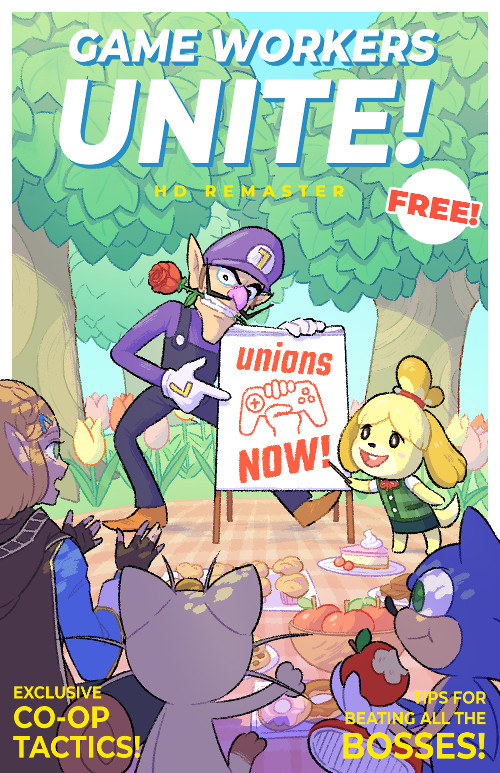We tend to prefer using the term “worker” rather than “employee” or “game dev” when we’re not mentioning a specific profession - like “programmer” or “artist”. The term “worker” is more inclusive and has much more to do with the realities of the game development industry than any other term and here’s why.
Games aren’t made in a vacuum.
When we talk about game workers, we're referring to anyone involved with the production of a game. Programmers, artists, designers, musicians? Yep. Voice and mocap actors, audio engineers? Definitely. Community managers? Of course.
But we're also talking about workers whom players may not instantly associate with production. What about factory workers who manufacture the consoles that games are played on? And workers mining the coltan used in those consoles? How about the people working to prepare food at the cafeteria on the company campus? Even if it may be less obvious, these workers are all essential to the production of games. They're game workers too.
If you're in the industry but currently unemployed, you're also a game worker. The same goes for students and interns.
Game work is work
Game dev is haunted by the term “passion”. But “passion” is the reason behind most of the abuse that plagues our industry: harassment, burn out, unpaid overtime, crunch, and the star system’s impunity provided to “elite” creators and studios. “Passion” systematically silences whatever you’re going through on behalf of a vague, intangible self-sacrificing ideal. “Passion” is an industry-wide gaslighting practice.
In this context, “worker” is a word to be reclaimed, along with its important political undertones. Defining yourself as a game worker is a friendly reminder — to you, your colleagues, manager, and CEO — that your job is not a fancy, it is how you make a living. Work is how you pay your rent, bills and get health insurance. No one is doing you a favor by having you on their payroll and allowing you to live your “passion”: you earn your place daily by providing specialized work in exchange for money and benefits.
Credit where credit’s due
The divisive and controversial topic of credits in game dev is highly characteristic of the need for workers to politicize and reclaim the definition of what is game work. Each company has its own freestyle policy on game credits and workers recognition, and it’s common knowledge that whatever chosen formula ends up being a general broken mess that generally leaves workers with the short end of the stick. More often than not, game devs find themselves and their work erased or misqualified from the credits of games they spent months or years working on. This comes as no surprise, in an industry where your job can have a completely different definition -or worth- depending on the studio that hires you. This lack of definition and recognition of who game workers are and what game work is highlights the need to unionize the industry, in order to give workers a foundation to stand up for their rights and what they are legitimately owed.
In an industry where so much labor is erased or goes unrecognized, it's important that we stick together, use the right vocab and resist bosses' efforts to define our realities, gaslight, divide and conquer.


